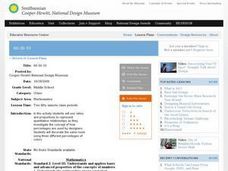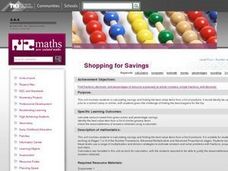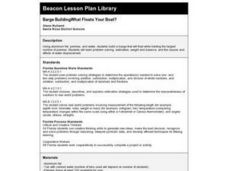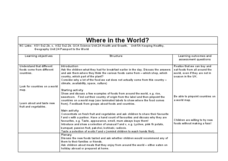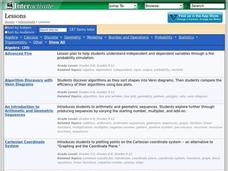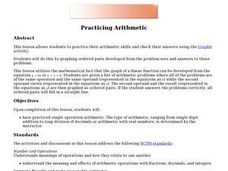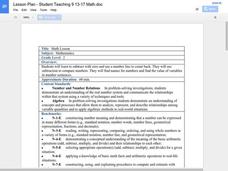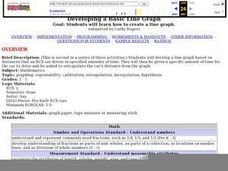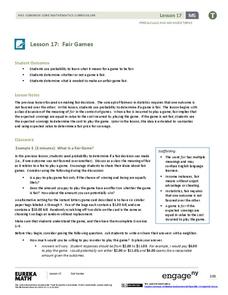Curated OER
60-30-10
Students use ratios and proportions to represent quantitative relationships as they investigate the concept of how percentages are used by designers. Students decorate the same room using three different percentages of colors.
Curated OER
Shopping for Savings
Fourth graders calculate savings and identify the best value items from a list of products. They rotate through five studying stations, completing various math activities involving calculators and solving problems related to shopping...
Pennsylvania Department of Education
Freckle Face
Students collect and record data. In this early data analysis lesson, students gather data about their partners face. As a class, the students use tally marks and pictographs to record the data and answer question about the information...
Curated OER
Making Change
Second graders explore how to incorporate a new type of technology, the cash register and/or a calculator, as a motivational tool for solving real life problems. They practice estimating money and counting back change from $20.00.
Curated OER
Barge Building: What Floats Your Boat?
Learners construct aluminum foil boats that float while holding the greatest number of pennies. They investigate the concept of water displacement, record their results, and watch a Bill Nye video on buoyancy.
Curated OER
Length Lotto-Teacher's Notes
Students convert metric units of length, specifically meters, centimeters, and millimeters. In this lesson of converting measurements, students participate in various games which require them to put the measurements in order or convert...
Curated OER
Where in the World
Students explore the global grid system. In this globe lesson, students identify latitude and longitude lines and how these can tell the coordinates of any place. They use the Internet to find the exact coordinates for their town.
Curated OER
Deric's Blotto
Students solve the handshake problem and investigate triangular numbers. In this geometry lesson, students investigate Blotto games as they apply concepts of triangles and geometric theorems.
Curated OER
Jazz and Math: Rhythmic Innovations
High schoolers compare and contrast the rhythms of marches and jazz. They watch an excerpt about Buddy Bolden from the PBS Ken Burns Jazz documentary, compare/contrast march and jazz rhythms, complete a worksheet, and notate and perform...
Curated OER
Expected Value
Students explore expected value, are introduced to the concept of varying payoffs, and have used a computer simulation of a "real world" example where expected value is used
Curated OER
Cutting the Wood
Students demonstrate and describe the effect of multiplying or dividing by a fraction less than or greater than one. They create and explain a variety of equivalent ratios that represent a given situation. Students draw a picture of...
Curated OER
How Does Radon Get In?
Pupils examine the potential sources of radon entry into homes. They compute the surface area for various objects, create a sketch of their home, calculate the ratio of air leaks to the outside surface area, and conduct a radon audit of...
Curated OER
Practicing Arithmetic
Students practice single operation arithmetic ranging from single digit addition to long division of decimals or real numbers using Graphit. They use data sets and rules to graph ordered pairs.
Curated OER
How Does Radon Get Into Your Home?
Students complete an experiment in which they measure the radon level in their home. They examine the different types of units of measurement and practice using them throughout the activity. They calculate surface area on objects as well.
Curated OER
Number Line Math
Second graders use a number line to practice subtraction. For this subtraction lesson, 2nd graders use a number line to count backwards. Students participate in mad math activities and solve problems.
Curated OER
Let's Take a Trip!
Sixth graders plan trip for family of four, and choose best travel plan by studying maps, considering different routes, and visiting Web sites to get airline and travel schedules.
Curated OER
Differentiate Elements, Compounds, and Mixtures
Students examine the differences between elements, compounds and mixtures. Using diagrams, they compare and contrast atoms and molecules and describe various chemical reactions. They distinguish the differences between ionic and...
Curated OER
Sieve of Eratosthenes
Young scholars investigate numbers, ways of representing numbers, relationships among numbers and number systems. They comprehend the meaning of operations and how they relate to each other.
Curated OER
The Home Stretch
Students read the novel Stone Fox by John Reynold Gardiner. Using Lego RCX units, students build and program sleds to re-enact the "home stretch" of the National Dog Sled Race.
Curated OER
Finding Addition Patterns
Students practice finding the sums of two-one digit numbers. For this addition lesson plan, students also record facts onto an addition chart.
Curated OER
Saving Money Through Mathematics
Third graders discuss light sources and collect data about energy sources. They compare data and create a multiple line graph showing energy used by light sources for each student in the group. They present their graphs and write a...
Curated OER
Reading Trees: Understanding Dendrochronology
Students examine tree-ring dating and discuss the lack of water the settlers in Jamestown faced. They create paper tree rings, simulate rain patterns, and describe the history of construction paper tree sequences.
Curated OER
RCX Car Line Graph
Students develop a line graph based on distances that an RCX car drives in specified amounts of time. They then are given a specific amount of time for the car to drive and be asked to extrapolate the car's distance from the graph.
Curated OER
Fair Games
Fifth graders examine the statistics of playing games. Many games of chance and activities in maths text books involve rolling two dice and combining the scores, usually by addition. Students often find the probabilities of such events...


